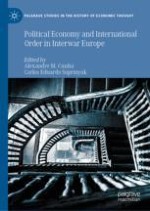2021 | OriginalPaper | Chapter
10. Ordoliberalism and the Rethinking of Liberal Rationality
Author : Timo Miettinen
Published in: Political Economy and International Order in Interwar Europe
Publisher: Springer International Publishing
Activate our intelligent search to find suitable subject content or patents.
Select sections of text to find matching patents with Artificial Intelligence. powered by
Select sections of text to find additional relevant content using AI-assisted search. powered by
